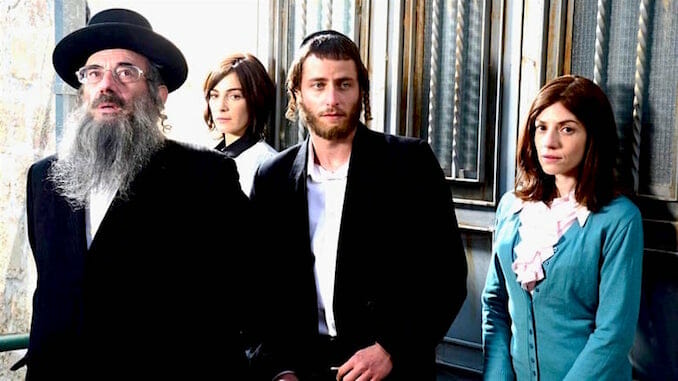The Quiet Magnetism and Intimate Longing of Shtisel on Netflix
Photo Courtesy of Netflix
Months after watching Shtisel, a hugely successful Israeli drama about an ultra-Orthodox family, I still find myself humming one of the show’s beautiful minimalist rifts by Avi Belleli. In doing so, I’m immediately filled with a very specific kind of longing, an indefinable mix of yearning and wistfulness that permeates the series. Despite finding itself on Netflix for its third (and final) season, Shtisel is not a natural binge watch. It’s the kind of show that is so raw and beautiful it can hurt; it requires breaks. But after a little while, I’d catch myself thinking about this family again, wanting to know what they were up to next so I could join them.
That is exactly the kind of warmth and intimacy that Shtisel creates for viewers as it weaves its slice-of-life narratives in modern Jerusalem. Faith, prayer, and observance are core aspects of the Shtisels’ lives, and the show presents Jewish orthodoxy without judgement. But it also bakes in some of its more problematic issues into the fabric of the narrative. No outsider comments on the foibles of a courtship process that involves one date before an engagement between teens, but we see over and over again how it causes innumerable problems, both in the short and long term. (It’s also a chaste series; you’ll find no sex or violence here. Current politics are also left out of the picture, as the scope remains small.)
The series, created by Ori Elon and Yehonatan Indursky, is anchored by the magnetic Akiva Shtisel (Michael Aloni), the youngest son of Rabbi Shulem (Dov Glickman), two quietly incendiary forces within the show. On the one hand we have the conservative, traditional father who is charming, but prideful and easily wounded. On the other is Akiva (or Kive) the starry-eyed dreamer and aspiring artist, one who is getting too old (26!) to not be married, and is therefore hounded on every side by those demanding he settle down with a real job and a good wife. Kive goes on dates, makes connections, develops infatuations, and can’t quite find the right fit. Meanwhile, Shulem—still mourning the death of his wife—dates a carousel of eligible women before ultimately rejecting each of them, but in his hypocrisy lambasts Kive for not making a choice.
Orbiting around these two is another Shtisel firebrand, Giti (Neta Riskin), who silently rages as she struggles to keep her family from falling apart. The series starts off with her husband Lippe (Zohar Strauss) abandoning her and their children while working abroad, but Giti rejects that fact and any outside help to try and make money on her own—all while her watchful daughter Ruchami (Shira Haas) both assists and grows deeply resentful towards both of her parents. When a contrite Lippe returns and Giti chooses to give up her independence and agency to let him back in, she nevertheless exerts power over Lippe by not letting him talk about or acknowledge what he did at all. As Lippe bumbles around this tense atmosphere, Giti holds on desperately to her self-protective delusion. By Season 3, her headstrong children have taken this accidental lesson from her and forge their own paths, as their modern-facing father can only impotently shrug and hope for the best.
This is the stellar work of Shtisel, which also utilizes elements of dreams and magical realism to reveal the true feelings and emotions of our characters that are so rarely acknowledged aloud. Its casual vignette-style of storytelling (which is stronger in its first two seasons, and loses some of its magic in a third season set six years later) also allows the characters’ worlds to feel relatably lived-in; so many scenes take place during meals or meal preparation, work, bedtime. For an American Gentile viewer, the customs of the intricacies of the Shtisels’ faith and daily goings on are foreign, but the general rhythms of life are all-too-familiar.
It is a fourth Shtisel sibling, Zvi Arye (Sarel Piterman), whose stories best embody this. Like his brother, sister, and father, he is hemmed in by the Orthodoxy’s traditional way of life. Instead of pursuing a singing career, he studies the Torah. Publicly he makes a spectacle of being the boss of his family, but privately his wife Tovi (Eliana Shechter) runs the show (and keeps him in line while also encouraging him). Zvi Arye is not as dynamic as the others and gets the fewest scenes, but his moments can also be the most poignant.
-

-

-

-

-

-

-

-

-

-

-

-

-

-

-

-

-

-

-

-

-

-

-

-

-

-

-

-

-

-

-

-

-

-

-

-

-

-

-

-








































